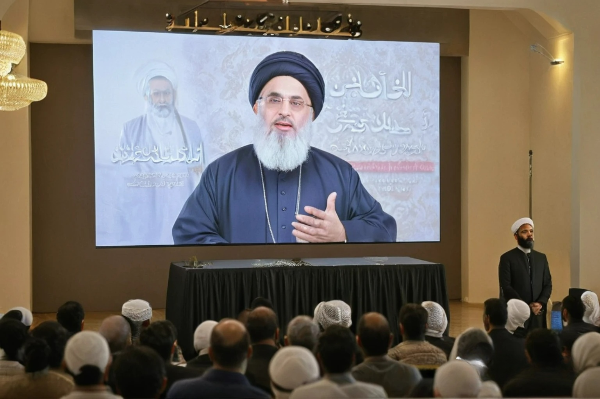Iran’s Plan to Strike Back Against the U.S.
Iran’s Military Preparations Following U.S. Attacks
Loading...

Both sides are adhering loosely to the rules of engagement, causing anxiety among Lebanese about what may unfold next.
Hezbollah leader Hassan Nasrallah's threat to target Cyprus has heightened tensions in the eastern Mediterranean amidst ongoing conflict with Israel, raising fears of a full-scale war.
Nasrallah stated on Wednesday that while Hezbollah prefers to avoid expanding the conflict, it stands ready, alongside regional allies, to match Israel's increased aggression. The threat towards Cyprus is a response to Nasrallah's claim that Israel is utilizing bases on the island.
"The Cypriot government should take heed that allowing Israeli access to airports and bases for operations against Lebanon means they are entering the conflict, and Hezbollah will treat them as such," Nasrallah warned.
While the United Kingdom maintains bases in Cyprus, there is no confirmed use of Cypriot land or airbases by Israel. Israel has previously conducted drills using Cypriot airspace.
Nasrallah's heightened rhetoric follows Hezbollah's release of drone footage purportedly taken over Haifa, Israel, as a warning of its capabilities should Israel escalate attacks on Lebanon.
Israel announced on Tuesday that operational plans for a military offensive against its northern neighbor have been approved and validated. More than 90,000 Israelis have evacuated their homes in the north since hostilities with Hezbollah began on October 8, one day after conflict erupted between Israel and Hamas in Gaza. Simultaneously, around 90,000 individuals have fled their homes in southern Lebanon due to Israeli airstrikes.
Anxiety is mounting in Lebanon over the potential outbreak of full-scale conflict between Hezbollah and Israel. "Lebanese citizens are increasingly fearful and anxious about the prospect of all-out war," said Salamey. "Israel's approval of a war plan is being taken very seriously in Lebanon, heightening fears of escalation. This approval has significantly undermined tourism and investment plans in the country, with potential visitors and investors reconsidering their decisions due to the increased threat of conflict."
Lebanon, plagued by one of the century's worst economic crises and without a president since October 2022, lacks political and economic stability. The country's infrastructure is strained, and an expanded war could have devastating consequences for the already struggling nation.
"Lebanon is ill-equipped to respond effectively to an Israeli invasion or an extensive aerial assault on its infrastructure," Salamey explained. "Significant escalation would be catastrophic, with infrastructure damage difficult to repair or replace. Lebanon lacks the resources for reconstruction, and there are few international donors willing to provide necessary support, unlike after the 2006 war."
Further disintegration of the Lebanese state could exacerbate regional political and social tensions, complicating recovery efforts, Salamey warned. "The destruction of Lebanon could lead to chaos, with armed groups entering its territory, creating a more unstable situation for both Israelis and Lebanese," he added.
However, should Israel escalate its military engagement with Lebanon, its military and civilian infrastructure could also face severe damage. Hezbollah, equipped with advanced weaponry including anti-aircraft missiles, has demonstrated its ability to challenge Israeli military operations.
"The Israeli approach appears remarkably insensitive to past lessons from Lebanon," observed Karim Emile Bitar, a professor of international relations at the University Saint Joseph in Beirut. "Their recent declaration of intent to wage total war against Hezbollah is at best naive and at worst, a display of amateurism."
Israel previously invaded Lebanon in 1978 and 1982, besieging West Beirut to expel the Palestine Liberation Organization (PLO) led by Yasser Arafat and occupying southern Lebanon until 2000.
While Israeli military leaders recognize Hezbollah's capabilities, there are domestic pressures, particularly from right-wing ministers like Itamar Ben-Gvir and Bezalel Smotrich, advocating military solutions over diplomacy. Smotrich even suggested reoccupying southern Lebanon, though Lurie-Pardes noted this was a fringe view within Israel.
There is widespread belief in Israel that achieving security in the north requires a ceasefire in Gaza, but Lurie-Pardes did not rule out the possibility of operating on two fronts. "Israel could manage another front," he said. "The human and financial costs would be immense, but it's feasible."
Politically, pressure is mounting in Israel as the school year approaches and northern residents demand to return home. There is a growing sentiment among Israelis near the border that they cannot live securely as long as Hezbollah remains nearby.
"The public wants reassurance," Lurie-Pardes remarked. "They want security in the north and to see military action that guarantees it."
"However, they also understand that Hezbollah, with its more complex arsenal, poses a greater challenge than Hamas."
What remains evident is that a broader conflict would yield few victors. Israel has struggled to achieve its objective of neutralizing Hamas over the past eight months, while Hezbollah presents a more formidable adversary than the Palestinian group. An escalated conflict risks unforeseen long-term consequences, as history has demonstrated.
"In 1982, Israel sought to eradicate the PLO, succeeding but inadvertently giving rise to Hezbollah, a more radical and organized movement than Fatah," Bitar reflected. "A similar scenario could unfold once more."
Iran’s Military Preparations Following U.S. Attacks
Troops remain in five strategic locations, raising fears of renewed tensions and long-term occupation.
Opposition forces have taken control of the capital after a significant offensive. Here is how it unravelled.
